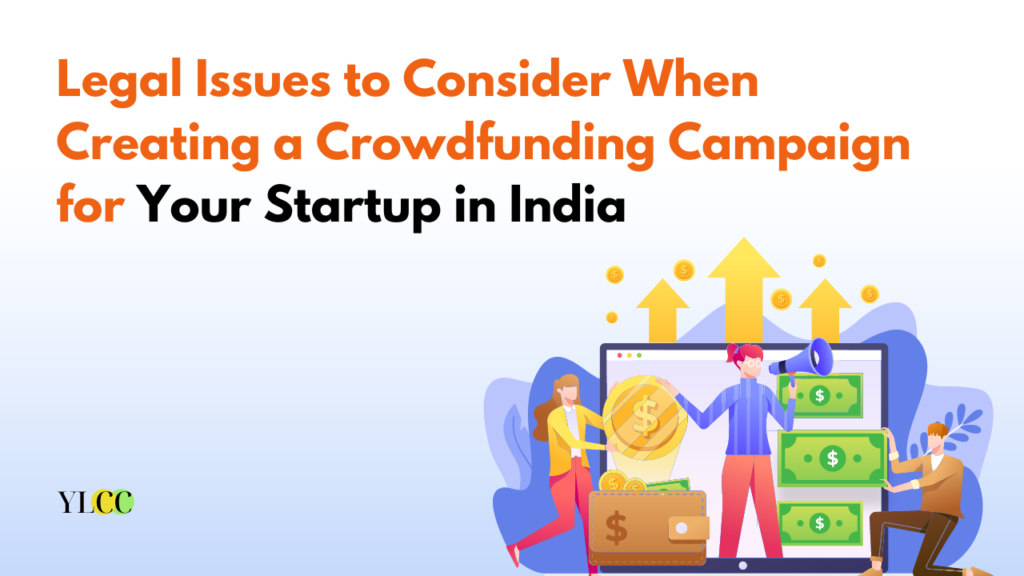
Are you an aspiring startup founder looking to bring your brilliant ideas to life through crowdfunding? While crowdfunding can be an exciting and effective way to raise capital, it’s not as simple as just setting up a campaign and waiting for the money to roll in. In India, crowdfunding campaigns are subject to various legal regulations and restrictions, which can pose some serious challenges for startups. To help you navigate this complex landscape, this article will explore the key legal roadblocks that you need to tackle while creating a crowdfunding campaign for your startup in India.
Crowdfunding: The Four Musketeers of Fundraising!
Crowdfunding has been further classified into 4 different types, each with their own unique characteristics and perks. Let’s take a closer look!
Equity-based crowdfunding:
Imagine being able to own a piece of a company with just a few clicks! That’s exactly what equity-based crowdfunding offers – a chance to invest in growth-stage companies in exchange for equity. However, it’s currently prohibited in India due to scams like the Sahara scam.
Donation-based crowdfunding:
Do you have a cause that you’re passionate about? The donation-based crowdfunding type is perfect for you! With this type of crowdfunding, people donate money to support a cause initiated by a company without expecting any returns. It’s perfect for social and artistic purposes.
Reward-based crowdfunding:
Do you like to be rewarded for your generosity? If yes, then reward-based crowdfunding is the way to go! In this type of crowdfunding, people donate money in expectation of certain returns as a form of reward. Think of it like a “thank you” for supporting a company.
Peer-to-Peer lending:
Do you have some extra money lying around? Why not put it to good use with peer-to-peer lending? With P2P lending, investors invest their money with a probable expectation of getting back their money with a certain nominal rate of interest. It’s a win-win situation for both parties!
In India, crowdfunding has become an easy, fast, and popular way to bring in funds for ventures. The lack of initial costs and the promise of shares or rewards make it an attractive option. However, SEBI has prohibited equity-based crowdfunding, and there is a need for regulation to protect investors from fraudulent acts.

Why Crowdfunding Rocks in India?
Did you know that crowdfunding is becoming the go-to method for raising funds in India? That’s right! And it’s no surprise why this method of funding is gaining so much popularity. Crowdfunding is easy, fast, and one of the most popular ways to bring in funds for ventures in India. And the best part? There’s little to no initial cost when it comes to raising funds. Plus, investors are often enticed by the promise of certain shares or rewards, making it a win-win situation for all parties involved.
Regulatory Framework – What You Need to Know
When it comes to crowdfunding in India, the Securities and Exchange Board of India (SEBI) is the big boss. Think of them like the referee who ensures that everyone plays by the rules. SEBI has issued guidelines on crowdfunding that startups must follow to avoid penalties and legal troubles.
So, what are these guidelines? Well, for starters, SEBI has placed restrictions on the types of securities that can be offered through crowdfunding. This means that not all types of securities can be offered on a crowdfunding platform. Startups must ensure that the securities they offer comply with SEBI guidelines.
Additionally, SEBI has set a maximum amount of funds that can be raised through crowdfunding, which is INR 10 crores (approximately USD 1.3 million) per year. This is to ensure that startups do not raise funds beyond their capacity or become too big too soon.
Lastly, SEBI has set eligibility criteria for issuers and investors. For instance, only startups that have been operational for at least two years can raise funds through crowdfunding. Investors also need to meet certain criteria, such as minimum net worth requirements.
Navigating these guidelines can be daunting, but startups can seek the help of legal experts to ensure that their crowdfunding campaign complies with SEBI regulations. By doing so, startups can avoid legal repercussions and focus on raising funds to bring their ideas to life!
Intellectual Property
When it comes to crowdfunding, startups need to keep their IPR game strong. Just imagine, you have come up with an innovative idea, spent countless hours developing it, and now you’re ready to launch a crowdfunding campaign to bring it to life. But wait, have you protected your IPR?
Think of it this way, protecting your IPR is like wearing armor to battle. You wouldn’t go into battle without armor, would you? Similarly, startups must not launch their crowdfunding campaign without protecting their IPR.
Startups need to protect their trademarks, patents, and copyrights, just like a superhero protects their secret identity. You wouldn’t want someone else to steal your logo, patent your idea, or use your copyrighted content without your permission, would you? Of course not! That’s why it’s crucial to protect your IPR.
But wait, there’s more! Startups must also ensure that their campaign doesn’t infringe on the intellectual property rights of others. Just like a hero wouldn’t steal from the innocent, startups must ensure that they don’t steal from other innovators.
And don’t forget, startups must also have the necessary licenses and permissions to use any intellectual property that they don’t own. It’s like getting permission from the city to use public property for a parade. You don’t want to get in trouble for using something that’s not yours!
Investor Protection: Because Your Money Matters!
Investing in a crowdfunding campaign can be exciting, but it’s important for investors to protect their hard-earned money. Startups must provide detailed information to investors about the potential risks and rewards associated with their crowdfunding campaign. They should also choose a crowdfunding platform that complies with the necessary regulations and offers sufficient investor protection measures, like escrow services and dispute resolution mechanisms.
Contractual Obligations: Dot Your I’s and Cross Your T’s!
When launching a crowdfunding campaign, startups must also consider the contractual obligations they are undertaking. This includes drafting clear and legally compliant terms and conditions for the campaign, outlining the rights and obligations of investors and the startup, and ensuring compliance with any other legal agreements that may be required. By paying attention to these details, startups can avoid legal issues and ensure a smooth crowdfunding campaign.
Conclusion: Crowdfunding Done Right!
Crowdfunding can be an excellent way for startups to raise capital and turn their ideas into reality. However, navigating the legal landscape can be challenging. By understanding the regulatory framework, protecting their intellectual property rights, complying with tax laws, ensuring investor protection, and fulfilling contractual obligations, startups can overcome these challenges and create a successful crowdfunding campaign. Don’t forget to seek legal advice to ensure compliance with all legal requirements and minimize risks!
This article has been written by Team YLCC. For any other queries, reach out to us at: queries.ylcc@gmail.com






